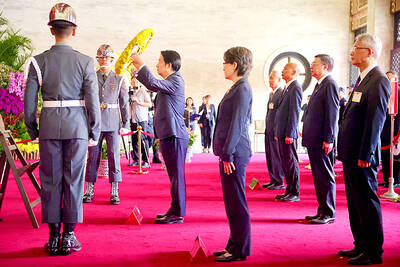With the opening of the first official school for the children of Taiwanese businessmen in China's Guangdong Province in September, the Taiwanese government is now preparing to make the school a model for similar projects in the future.
Officials said the criteria under which the registration of the Dongguan Taiwan Businessmen's Children School (
The Mainland Affairs Council and Ministry of Education are planning to send a delegation to inspect the school's facilities and administrative operations in November or December as the basis of setting up a standard, officials said. After Dongguan, Taiwanese businessmen in Shanghai and Suzhou reportedly also have plans to set up schools there for Taiwanese children.
There are an estimated 45,000 Taiwan businesses in China with over 200,000 Taiwanese employees. Shanghai is the city with the largest concentration of Taiwanese businesses.
However, fearing that their children might be "brainwashed" by China's communist-oriented education system, most Taiwanese businessmen and their employees have been hesitant to send their children to Chinese schools, and many would rather leave them in Taiwan -- obviously, a far from ideal situation.
Yeh Hung-teng (葉宏燈), former chairman of the Taiwan Businessmen Association in Dongguan (東莞市台商投資企業協會), began planning the Dongguan school in 1995 in light of the high demand from Taiwanese businessmen.
After years of negotiations, the Guangdong Provincial Government officially approved the school's establishment in October 1999, agreeing that the school could appoint a Taiwanese principal, hire Taiwanese teachers and adopt textbooks from Taiwan.
This format, which gives the school a status close to that of an international school, is a breakthrough on the side of China, sensitive as it is to any recognition of Taiwan's sovereignty.
Compromises, however, were also made to gain China's approval to set up the school.
The school will neither raise the Republic of China flag nor sing its national anthem.
Also, wording that might "impair the development of cross-strait relations" was removed from textbooks.
The Taiwanese government, meanwhile, approved the school's registration as a "special case."
Though the Ministry of Education currently oversees the establishment of Taipei Schools -- overseas schools for Taiwanese expatriates -- the Taiwanese businessmen in China are not officially considered expatriates. These international schools offer courses identical with those in Taiwan schools and receive government funding.

RESPONSE: The transit sends a message that China’s alignment with other countries would not deter the West from defending freedom of navigation, an academic said Canadian frigate the Ville de Quebec and Australian guided-missile destroyer the Brisbane transited the Taiwan Strait yesterday morning, the first time the two nations have conducted a joint freedom of navigation operation. The Canadian and Australian militaries did not immediately respond to requests for comment. The Ministry of National Defense declined to confirm the passage, saying only that Taiwan’s armed forces had deployed surveillance and reconnaissance assets, along with warships and combat aircraft, to safeguard security across the Strait. The two vessels were observed transiting northward along the eastern side of the Taiwan Strait’s median line, with Japan being their most likely destination,

‘NOT ALONE’: A Taiwan Strait war would disrupt global trade routes, and could spark a worldwide crisis, so a powerful US presence is needed as a deterrence, a US senator said US Senator Deb Fischer on Thursday urged her colleagues in the US Congress to deepen Washington’s cooperation with Taiwan and other Indo-Pacific partners to contain the global security threat from China. Fischer and other lawmakers recently returned from an official trip to the Indo-Pacific region, where they toured US military bases in Hawaii and Guam, and visited leaders, including President William Lai (賴清德). The trip underscored the reality that the world is undergoing turmoil, and maintaining a free and open Indo-Pacific region is crucial to the security interests of the US and its partners, she said. Her visit to Taiwan demonstrated ways the

GLOBAL ISSUE: If China annexes Taiwan, ‘it will not stop its expansion there, as it only becomes stronger and has more force to expand further,’ the president said China’s military and diplomatic expansion is not a sole issue for Taiwan, but one that risks world peace, President William Lai (賴清德) said yesterday, adding that Taiwan would stand with the alliance of democratic countries to preserve peace through deterrence. Lai made the remark in an exclusive interview with the Chinese-language Liberty Times (sister paper of the Taipei Times). “China is strategically pushing forward to change the international order,” Lai said, adding that China established the Asia Infrastructure Investment Bank, launched the Belt and Road Initiative, and pushed for yuan internationalization, because it wants to replace the democratic rules-based international

WAR’S END ANNIVERSARY: ‘Taiwan does not believe in commemorating peace by holding guns,’ the president said on social media after attending a morning ceremony Countries should uphold peace, and promote freedom and democracy, President William Lai (賴清德) said yesterday as Taiwan marked 80 years since the end of World War II and the Second Sino-Japanese War. Lai, Vice President Hsiao Bi-khim (蕭美琴) and other top officials in the morning attended a ceremony at the National Revolutionary Martyrs’ Shrine in Taipei’s Zhongshan District (中山) to honor those who sacrificed their lives in major battles. “Taiwanese are peace-loving. Taiwan does not believe in commemorating peace by holding guns,” Lai wrote on Facebook afterward, apparently to highlight the contrast with the military parade in Beijing marking the same anniversary. “We